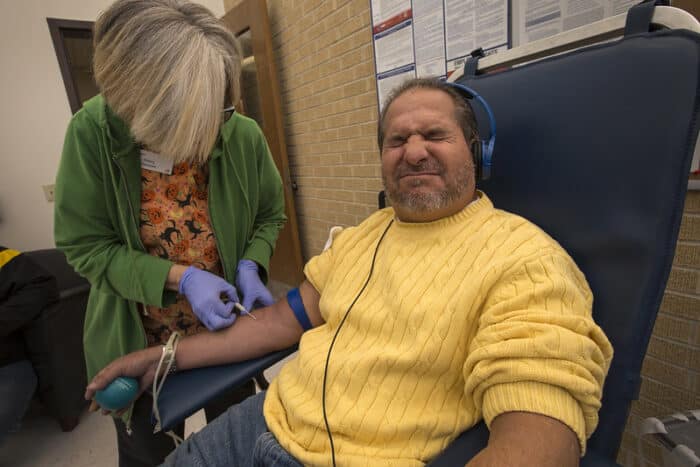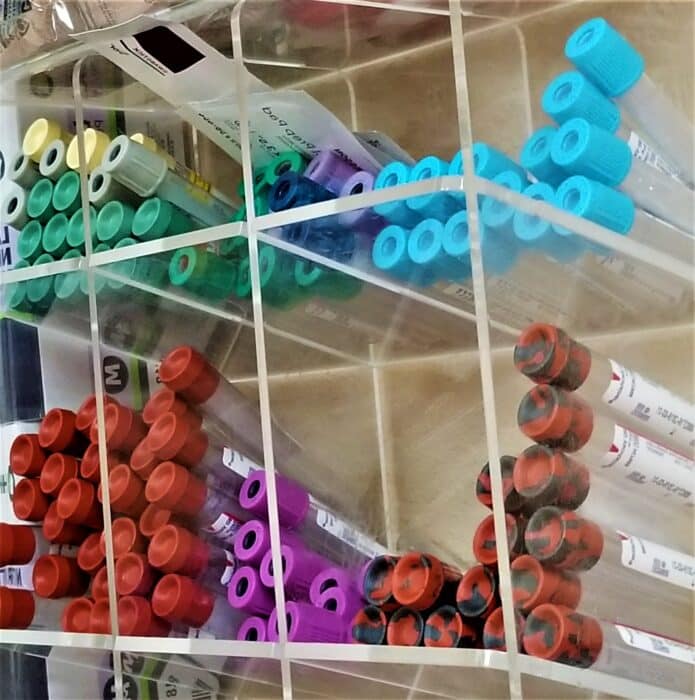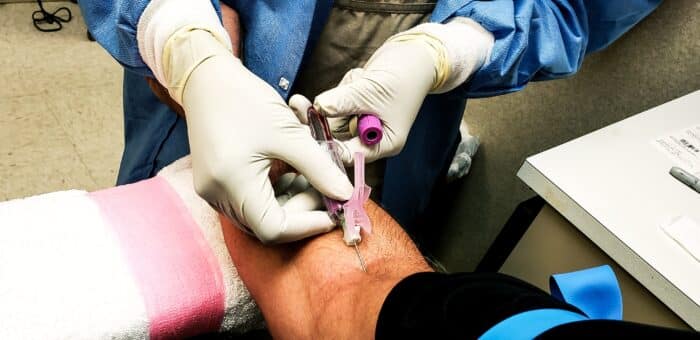If you’re an aspiring phlebotomist who has successfully completed their phlebotomy training, you might be curious about your next steps.
The next step usually involves landing your perfect dream job. The process does sound intimidating, but we’re here to tell you that it’s not as difficult.
In this article, we will navigate you through the process of how you can prepare and ace those interviews that will land you your dream job.
So, let’s get started!
Read: What is a Phlebotomist

Do You Want To Become a Phlebotomist? Check Out Free Phlebotomist Masterclass!
In our masterclass you learn:
- How to be a Phlebotomist faster…in just 2 months!
- Avoid student debt & driving to classes
- #1 thing employers want from Phlebotomists
- How to stand-apart & get a university certificate for a strong resume
Phlebotomy Interview Tips
Before we start talking about the top 10 questions you might get asked in a phlebotomy job interview and how to answer them.
Let’s cover some important things to help you do really well in your interview:
1. Dress nicely: When you meet the people at the interview, what you wear is important. Pick clothes that look professional and make sure you look clean and tidy.
2. Learn about the place: Before you go to the interview, find out about the hospital or clinic where you want to work. Know what they do, what they care about, and if they’ve gotten any recent awards or recognition.
3. Practice talking: Good communication is really important in phlebotomy. Be ready to show that you can explain what you’re doing and make patients feel comfortable.
4. Brush up on what you know: Make sure you remember the important things about phlebotomy procedures, how to prevent infections, and the words used in medicine.
5. Ask questions: Interviews aren’t just about the company asking you things. Be ready to ask your own questions about the job, the people you’d work with, and what it’s like to work there.
Also See: How to Become a Phlebotomist
Top 10 Interview Questions With Answers
Now, let’s move on to the main part – the top 10 questions you might be asked in a phlebotomy job interview, along with some example answers.
1. Tell us about your phlebotomy training and experience.
Answer: “I finished a thorough phlebotomy training program, which included both classroom learning and hands-on practice. During my training, I learned how to draw blood from veins and skin, and I also learned how to properly identify patients. I’m very careful about following procedures to prevent infections.”
2. How do you make sure patients feel comfortable during blood draws?
Answer: “I focus on making patients feel at ease. I explain what I’m going to do, use techniques to minimize pain, and I’m always ready to listen to any concerns or questions the patient may have.”
3. Can you explain how you handle patients who are nervous or difficult to work with?
Answer: “When I deal with anxious or difficult patients, I stay patient and understanding. I try to build trust by explaining the procedure in detail and addressing their concerns. My goal is to make sure they have a good experience.”
4. How do you maintain cleanliness and safety in your work?
Answer: “I’m very strict about following rules to prevent infections. I wash my hands properly, wear protective gear, and keep my workspace clean. I also regularly clean my equipment and dispose of used materials safely.”
5. What do you do to prevent problems during blood collection?
Answer: “I review the patient’s medical history, check their identity, and assess their overall health before I start drawing blood. This helps me find possible issues and take the right precautions.”
6. How do you handle a situation where it’s hard to find a patient’s vein?
Answer: “If I can’t find a patient’s vein easily, I use different techniques I’ve learned, like using smaller needles or applying a warm compress to help the vein expand. The patient’s safety and comfort are my top priorities.”
7. Why is patient confidentiality important in healthcare?
Answer: “Keeping patient information private is crucial in healthcare. Sharing their information without permission breaks their trust and can lead to serious legal problems. I always keep things confidential.”
8. How do you stay updated on the latest phlebotomy methods and industry trends?
Answer: “I’m committed to learning continuously. I attend workshops, seminars, and webinars to keep up with the latest phlebotomy techniques and trends. I also read reputable healthcare journals.”
9. Can you talk about a tough situation you faced in a previous phlebotomy job and how you solved it?
Answer: “Certainly. In my previous job, I had a patient who was terrified of needles. I took extra time to reassure and comfort them, used distraction techniques, and successfully drew their blood while making sure they were comfortable.”
10. Why do you want to work at our healthcare facility?
Answer: “I’m impressed by your facility’s dedication to patient care and the positive feedback it has received. I believe that my commitment to phlebotomy and patient well-being matches your values, making it a perfect place for my career.”
Read: What is a Phlebotomist
Conclusion
With some practice, self-assurance, and knowing the typical questions, you can show your abilities and get the phlebotomy job you’ve been aiming for.
Remember, it’s not only the words you use but also the way you say them and the enthusiasm you show for taking care of patients.
Related Resources:
- Phlebotomist Salary
- Phlebotomist Skills
- Ultimate Phlebotomist Resume Guide – Phlebotomy Job
- How To Choose Phlebotomist Classes Online?
- What is the Difference Between a Licensed Phlebotomist and Certified Phlebotomist?
- Phlebotomist Degree
- How To Get a Phlebotomy Certification
- How Long is a Phlebotomy Course?
- Phlebotomist Cover Letter
- Therapeutic Phlebotomy
- Certified Phlebotomy Technician
- EKG Phlebotomy Technician
- Online Phlebotomy Certification
- ASCP Phlebotomy Certification
- Phlebotomy Certificate
- Phlebotomy Classes Cost
- Cheap Phlebotomy Classes
- Order of Draw Phlebotomy
- Phlebotomy Internship
- 4-Week Phlebotomy Classes Online
Related Articles
-
How to Be Successful in College in 2022 – 7 Simple Tips to Succeed
-
How Do Scholarships Work? Read This First…Truth is Shocking
-
7 Best College Majors 2024: What Should I Major In?
-
How to Choose a College – 10 Things You Must Consider in 2024
-
Why Go to College? Top 13 Benefits for Adult Students in 2022
-
Top 5 Best Alternatives to Community College for 2024








